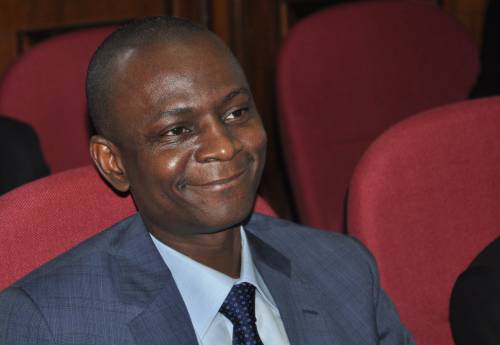A Federal High Court in Lagos will on April 23 rule on a suit filed by ex-President Goodluck Jonathan’s cousin, challenging his arrest and detention for alleged N650 million fraud.
Azibaola is asking the court to enforce his fundamental human rights by setting him free and that the Economic and Financial Crimes Commission (EFCC) had no power to arrest him based on “a civil transaction”.
Azibaola had filed the suit following his arrest and detention by the EFCC in April 2016. He has since been arraigned and granted bail by a Federal High Court in Abuja.
The defendant, in the suit filed on his behalf by a human rights lawyer, Mr Ebun Olu-Adegboruwa, joined the EFCC and the Attorney-General of the Federation as respondents.
At the hearing of the case on Tuesday, Mr Kingsley Izima, counsel to the applicant, was present in court, while the respondents were not represented by any counsel.
Izima had informed the court that the respondents had filed their counter-affidavit but were not in court to move the application.
He urged the court to declare the remand and detention of the applicant by the respondents as a violation of his fundamental human rights.
However, Justice Mojosola Olatoregun held that the court would give the respondents an opportunity to be heard.
The court ordered the applicant to produce more facts about the case in a further affidavit to assist the court in reaching a decision.
It further instructed the Deputy Registrar of the court to write the respondents to inform them of the next date of adjournment.
Consequently, the case was adjourned until April 23 for hearing.
Azibaola was alleged to have received 40 million dollars sometime in September 2014 from a former National Security Adviser, retired Col. Sambo Dasuki for allegedly supplying “tactical communication kits”.
The EFCC said he received another N650 million from Dasuki on Dec. 8, 2014.
The plaintiff, however, is urging the court to hold that Sections 293 and 294 of the Administration of Criminal Justice Act (ACJA) of 201 which the EFCC relied on to secure remand orders from a magistrate court were inapplicable in his case.
He said the sections were for capital offences for which a legal advice from the Attorney-General is required before a charge is filed, insisting that the sections did not apply to financial crimes.
According to him, under Section 8 of the ACJA, he should not be arrested or prosecuted for a civil contract or transaction.
The commission had filed a counter-affidavit, stating that Section 264 of the ACJA empowers it to detain suspects based on remand warrants issued by magistrate courts. (NAN)

